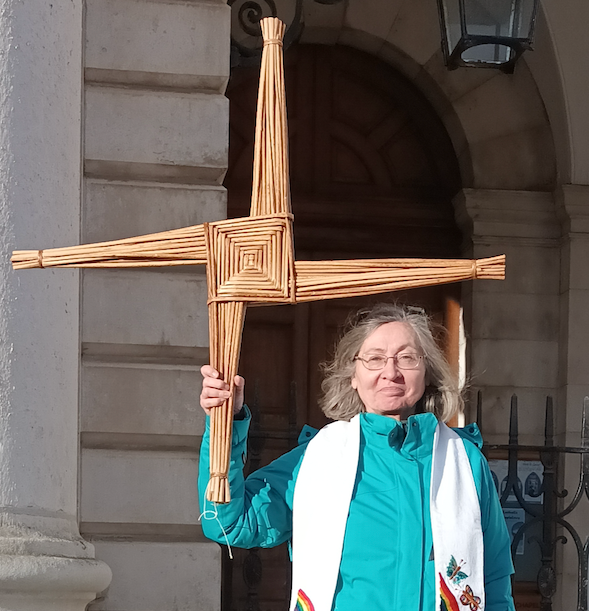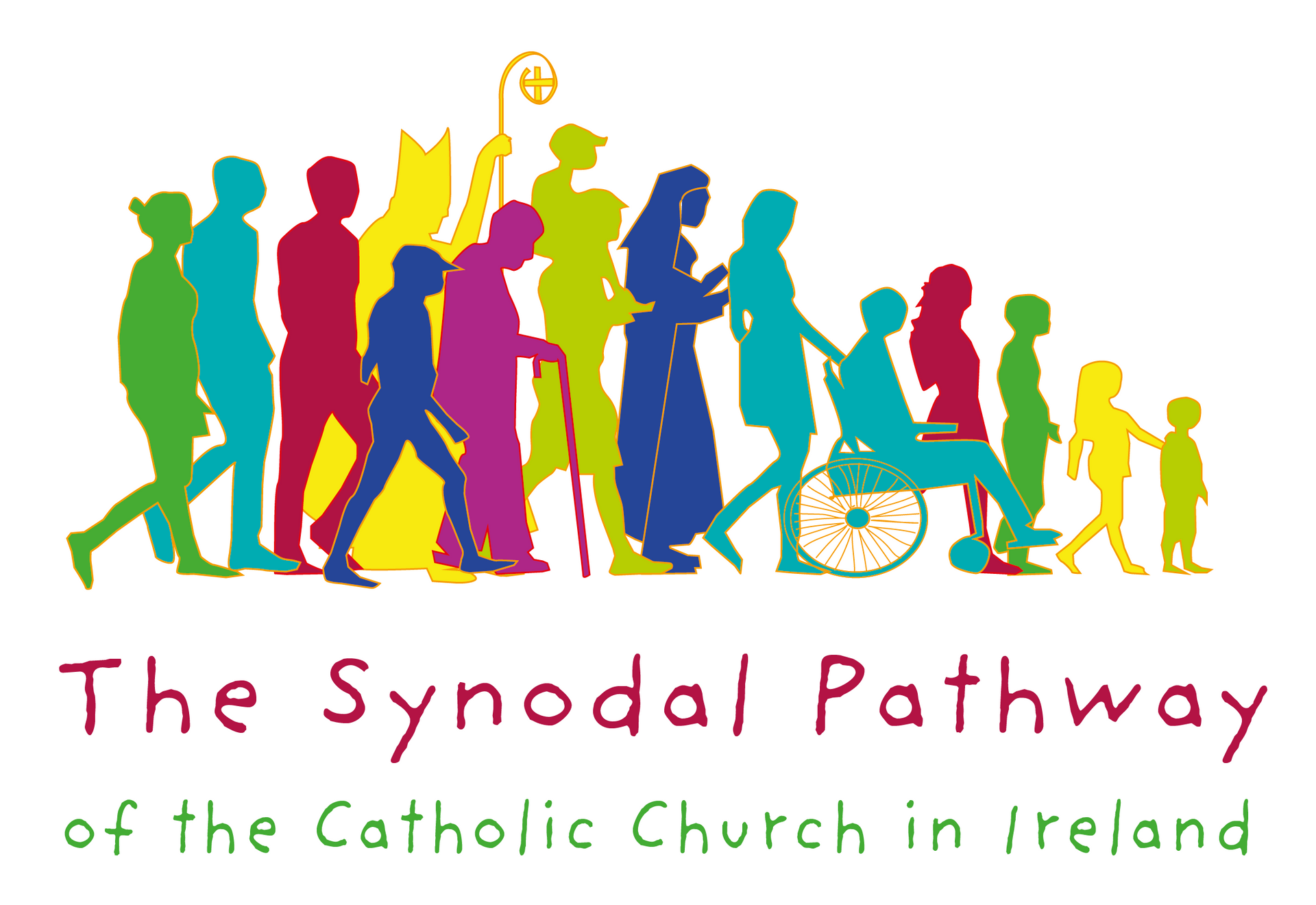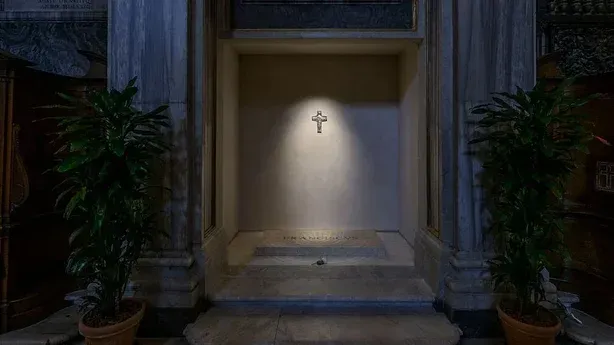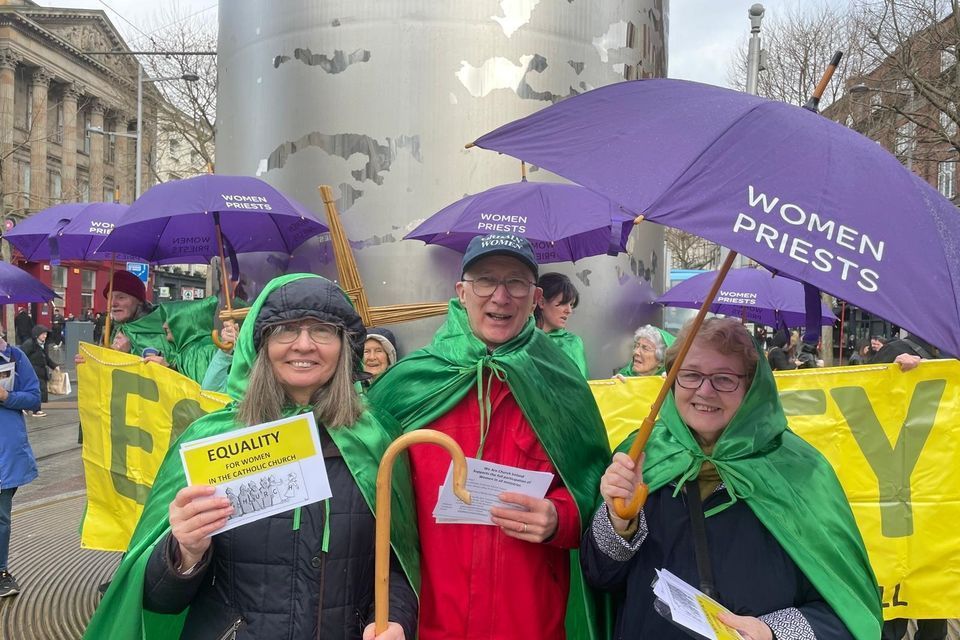Who will roll away the stone of patriarchy from our Church tomb.
Article in Irish Daily Mail 26 April 2025 by Soline Humbert
Transcript of article.
Who will roll away the stone of Patriarchy from our Church tomb?
Popes come and go, Christ remains; and with Christ the community of disciples we call church. It has been like that for two millennia. Today Pope Francis is being buried, his work done. Next month another man, a cardinal will be elected by his male peers to take his place as bishop of Rome. As a woman in the Catholic Church, I am very aware that this remains an exclusively male process, and glaringly so. It was like this for all the centuries when women were deemed inferior and subordinate, but it has remained so while we have been slowly recognised as equal in dignity in the last few decades. That nothing has changed in this selection process highlights the deep inequality which, shamefully, remains the hallmark of the church. While women make up more than half of the church, when it comes to choosing the head of their church (under Christ) we might as well not exist. The Catholic Church in its present form is still solidly a patriarchal institution.
A few years ago, during a conclave in Rome some Catholic women released pink smoke to highlight the exclusion and invisibility of women. Since then, there has been an increasing awareness of misogyny and the unjust marginalisation of women within the institutional church.
Sixty years ago, at the Vatican II Council Cardinal Suenens asked his fellow bishops, all men:
"Where is the other half of the Church?"
And now, during this conclave, will there be one courageous cardinal who will at least look around the all - male grouping and ask the same question? Will women's absence be noticed and their presence missed?
I don't know but I would hope so.
Somewhat ironically a religious sister, Sr Simona Brambilla, who is head of a Vatican department normally held by a cardinal, received a few days ago a standard email sent to cardinals summoning them to participate in the pre- conclave discussions. Of course she wasn't invited: it was a mistake...and a sign from the Holy Spirit flagging the patriarchal church?
To ask where the Church should go is to affirm that the Church is not static and unchanging, but dynamic and on the move. It is acknowledging and taking seriously the historical reality that while the church has existed for two thousand years it has undergone many transformations and will continue to evolve beyond our wildest imaginings. That means breaking new ground, taking risks. Resisting and attempting to cling to the past, to what "one has always done" (which in itself is an illusion, as everything was new at some stage) is a sure recipe for disaster.
I believe the Spirit is active at the heart of all creation and in the Church and is leading us forward. Fidelity cannot just be with reference to the past. We are called to be creatively faithful to the future, letting go of what is no longer fitting and embracing what love requires of us in these times, our times.
Last Sunday was Easter, and listening to the Gospel I was particularly struck how often the word "tomb" was mentioned. Everything revolved around that tomb. Jesus’s disciples expected him to be there, looked for him there, didn't find him there.
And then, as the death of Pope Francis was announced the following day, I thought again about that tomb and a question arose in my mind: In what way is the Church a tomb for a dead Christ?
It is telling that on Easter Sunday the Gospel text proclaimed at Mass is cut short, leaving out the Risen Christ appearing first to Mary of Magdala and commissioning her to proclaim the Good News of his Resurrection. Hence her title of Apostle to the apostles. Had he chosen to appear first to Peter this would be centre stage on Easter Sunday. But to the patriarchal mindset this is still too subversive, two millennia on. Like many women I ask: How long more shall we have to wait?
A few days before he was elected back in March 2013 Pope Francis had told his fellow cardinals:
"I have the impression that Jesus is locked inside the Church and that he is knocking because he wants to get out".
To me that church where Jesus is locked in is like a tomb: the church as a place of confinement for a dead corpse, with nothing of the joyful exuberance of life stronger, and stranger, than death! The church as tomb with a big stone rolled in front of it cannot be a credible witness and fulfil its mission.
"Who will roll away the stone for us" asks Mary of Magdala and the other women disciples.
I ask: "Who will roll away the stone of patriarchy from our church tomb which makes of us second- class members and seeks to bury women’s forbidden vocations?"
While Pope Francis repeated "my door is always open", there is one group of people to whom it remained firmly shut throughout: women with vocations to the presbyteral ministry (priesthood).
I hope that his successor will be open to an encounter and a dialogue. Like Mary of Magdala we have good news to deliver, even if it appears preposterous to male ears and like her at first, we are considered unreliable witnesses.
I dream of the Church freeing itself from its patriarchal structure and mindset, its tomb, and where women's baptismal equality is at long last a shining reality. This means, at a minimum, full access to all ministries beyond the sexual division of roles and gender mandates. To put it bluntly it would mean the end of the oppressive sacralised gender- apartheid in the church.
Pope Francis has set the church on a synodal path, meaning that all members truly are the church, and together share in the responsibility of fulfilling the Church's mission. That's a fledgling beginning and an aspiration. If the church continues on this path wholeheartedly in a true spirit and doesn't just go through the motions, I have no doubt that it will bear fruit in terms of new life, fresh energy, credible witness. But it is a big If, as it would mean quite a radical dismantling of the clerical hierarchical pyramid where decisions affecting all are made by a few men.
Resistance is rife and cannot be underestimated. The choice of Francis's successor will be crucial in this regard: If the new Pope doesn't champion synodality and if it doesn't grow and deepen and is thoroughly embedded in hearts, minds and structures, it will be no more than a decorative coat of varnish on the age- old pattern of pay, pray and obey. There is a choice still to be made between a church of sisters and brothers where all are disciples and equal, and a church of "fathers" lording it over "children". We know how much that kind of church has been a fertile ground for crimes and abuses of all kinds especially against children and adults in positions of vulnerability: sexual, physical, psychological, spiritual abuses and their systemic coverups. The work has really only begun, in some countries hardly at all, and there is still massive denial as to the scale and depth of the abuses. Where power inequality exists and is sacralised the rotten fruit of criminal abuses abound.
As Christians we believe that it is truth, and only truth, that can set us free. And yet there persists a deep-seated attitude that what is important is the appearance, no matter how much at odds it is with the reality. One of the most damaging aspects in terms of integrity has had to do with sexuality. It has been shown for decades that a very substantial number of clergy of all ranks have active sexual lives but all this is swept under the carpet. It is more important that the faithful are kept in the dark and the rule of mandatory celibacy is maintained for priests. The reality is that only a small number of men have the charism of celibacy, a much smaller number than is claimed, but it is easier to keep pretending rather than to grasp that particular nettle.
The cost is enormous as lies, duplicity and double lives weave webs of deceit throughout.
The clerical church has a long way to go concerning its attitude to sexuality in general and the dysfunctional way clergy sexuality is lived and dealt with, or rather not dealt with, casts a very long shadow. Who among the leadership will have the courage to lift that particular veil and face the truth? If it doesn't happen the church community will remain prisoner of its lies and deceptions, and that is an issue for all continents.
All I know is that the future will be different, because the present is heavily pregnant with change: the new will be born. We are its mothers and midwives. Much of what appears still alive is only kept alive through artificial respiration, not the breath of the Spirit: an enforced uniformity, a concentration and centralisation of power dressed up as service.
When the wind blows the house built on rock remains, the one built on sand collapses. There is much that is built on sand in the church and these walls could fall anytime. But I also believe that the Gospel of love is rock solid, a firm foundation and that this will endure. The future is uncertain but if together we have the humility and courage to trust the Risen Christ who goes before us and whose Spirit is in us, we will rise from our tombs and step into the freedom of a new dawn. Faith has always been an adventure filled with surprises. In this jubilee year we journey on in hope, taking our places with all of humankind, all of creation, in the great cosmic divine adventure. And at times we may even dance!
Soline Humbert is a member of We Are Church Ireland and the author of A Divine Calling - One woman's life -long battle for equality in the Catholic Church (The Liffey Press, September 2025)












